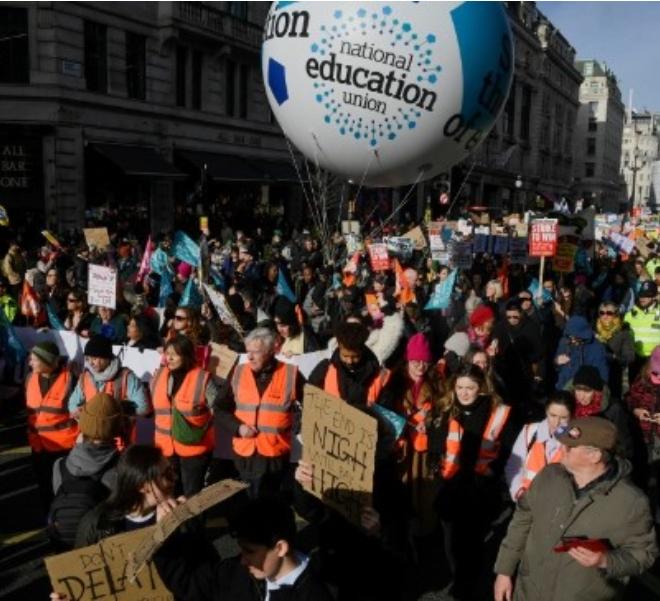Half a million workers went on strike in Britain on Wednesday, calling for higher wages in the largest such walkout in over a decade, closing schools and severely disrupting transport.
As Europe battles a cost-of-living crisis, Britain’s umbrella labour organisation the Trades Union Congress called it the “biggest day of strike action since 2011”.
The latest strikes come a day after more than 1.27 million took to the streets in France, increasing pressure on the French government over pension reform plans.
British Prime Minister Rishi Sunak has called for pay rises to be “reasonable” and affordable” warning that big pay rises would jeopardise attempts to tame inflation.
But unions have accused millionaire Sunak of being out of touch with the challenges faced by ordinary working people struggling to make ends meet in the face of low paid, insecure work and spiralling costs.
Teachers and train drivers were among the latest groups to act, as well as border force workers at UK air and seaports.
“The workload is always bigger and bigger and with the inflation, our salary is lower and lower,” London teacher Nigel Adams, 57, told AFP as he joined thousands of teachers marching through central London.
READ ALSO: Why CBN Shouldn’t Extend Naira Swap Deadline – Atiku
“We’re exhausted. We’re paying the price and so are the children,” he added as protesters held up placards reading “Pay Up” and “We can’t put your kids first if you put their teachers last”.
Britain has witnessed months of strikes by tens of thousands of workers – including postal staff, lawyers, nurses and employees in the retail sector — as UK inflation raced above 11 percent, the highest level in more than 40 years.
Job centre worker and union representative, Graham, who preferred not to give his last name said workers had no choice but to strike faced with soaring costs.
“Some of our members, even though they are working, still have to make visits to food banks,” he said.
“Not only are wages not keeping up, but things like fares, council tax and rents are going up. Anything we get is eaten away,” he added.
– ‘Slap in face’ –
At London’s King’s Cross rail station, Kate Lewis, a 50-year-old charity worker, said she sympathised with the strikers despite her train being delayed.
“I understand. We are all in the same boat. All impacted by inflation,” she said.
READ ALSO: Nigeria’s Rising Debt Stock Will Affect Infrastructural Projects, Economy – Expert
Another major commuter hub in the capital, London Bridge station, was completely closed.
One train driver who gave his name as Tony, 61, said the sort of pay rises on offer were insulting, especially in the wake of the pandemic.
“We worked all through Covid. We were being praised as key workers and then there is this slap in the face,” he said.
“I was leaving (home) at 3 am to go to work. People were having barbecues, you could hear the bottles. I think we deserve a pay increase that keeps up with inflation.”
Government and company bosses are standing firm over wage demands.
With thousands of schools closed for the day, Education Minister Gillian Keegan told Times Radio she was “disappointed” teachers had walked out.
But union boss Mark Serwotka said the government’s position was “unsustainable”.
“It’s not feasible that they can sit back with this unprecedented amount of industrial action growing, because it’s half a million today,” he told Sky News.
“Next week, we have paramedics, and we have nurses, then will then be the firefighters,” he added, warning that unions were prepared to strike throughout the summer.
Prime Minister Sunak on Wednesday told parliament the government had given teachers the “highest pay rise in 30 years” including nine percent for newly qualified teachers.
He urged opposition Labour Party leader Keir Starmer to say “that the strikes are wrong and we should be backing our school children”
– Nationwide rallies –
READ ALSO: Again, Buhari’s Government Drops In Corruption Ranking
The latest official data shows 1.6 million working days were lost from June-November last year because of strikes – the highest six-month total in more than three decades – according to the Office for National Statistics.
A total of 467,000 working days were lost to walkouts in November alone, the highest level since 2011, the ONS added.
Alongside the strikes, unions are also staging rallies across the country against the Conservative government’s plans to legislate against public sector strike action.
Sunak has introduced a draft law requiring some frontline workers to maintain a minimum level of service during walkouts.
AFP
